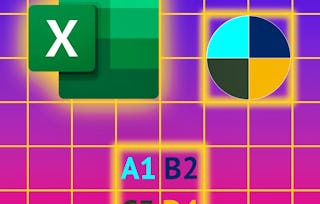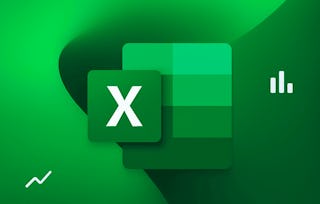"Everyday Excel, Part 1" is aimed at learners who are seeking to learn Excel from the ground up. No experience with Excel is necessary. While this course is meant for beginners of Excel, advanced users will undoubtedly pick up new skills and tools.

Everyday Excel, Part 1
Seize the savings! Get 40% off 3 months of Coursera Plus and full access to thousands of courses.

Everyday Excel, Part 1
This course is part of Everyday Excel Specialization

Instructor: Charlie Nuttelman
299,226 already enrolled
Included with
3,675 reviews
Recommended experience
What you'll learn
Navigating Excel, editing the worksheet (including inserting/deleting cells, columns, and rows), and cell formatting.
Expression entry and common Excel formulas (including logical functions, text functions, and financial functions).
Data management (sorting, filtering, consolidating, removing duplicates, data validation, and one-way lookups).
Data visualization (scatter plots, column charts, pie charts, Slicers, Sparklines, and Pivot Tables).
Skills you'll gain
Tools you'll learn
Details to know

Add to your LinkedIn profile
6 assignments
See how employees at top companies are mastering in-demand skills

Build your subject-matter expertise
- Learn new concepts from industry experts
- Gain a foundational understanding of a subject or tool
- Develop job-relevant skills with hands-on projects
- Earn a shareable career certificate

There are 6 modules in this course
Earn a career certificate
Add this credential to your LinkedIn profile, resume, or CV. Share it on social media and in your performance review.
Instructor

Offered by
Explore more from Design and Product
 Status: Free Trial
Status: Free TrialUniversity of Colorado Boulder
 Status: Free Trial
Status: Free TrialKnowledge Accelerators
 Status: Free Trial
Status: Free TrialUniversity of Colorado Boulder

Packt
Why people choose Coursera for their career

Felipe M.

Jennifer J.

Larry W.

Chaitanya A.
Learner reviews
- 5 stars
83.31%
- 4 stars
11.75%
- 3 stars
1.68%
- 2 stars
0.59%
- 1 star
2.63%
Showing 3 of 3675
Reviewed on May 18, 2020
Very much basic course and the instructor described Everything very nicely..Its a must for the beginne.. Had to work hard to go through the course and finally came out to be successful
Reviewed on Aug 28, 2020
This is one of the BEST course I have done in Coursera. I must say special "Thank You" to Charlie Nuttelman Sir, the way he taught us was excellent. In future I must do other two courses.
Reviewed on Apr 17, 2021
Really good course for absolute beginners. It helps a lot to learn and practice on my own with the assignments. And the course instructor is also nice to us. Thanks for this course. Wating for Part 2.

Open new doors with Coursera Plus
Unlimited access to 10,000+ world-class courses, hands-on projects, and job-ready certificate programs - all included in your subscription
Advance your career with an online degree
Earn a degree from world-class universities - 100% online
Join over 3,400 global companies that choose Coursera for Business
Upskill your employees to excel in the digital economy

